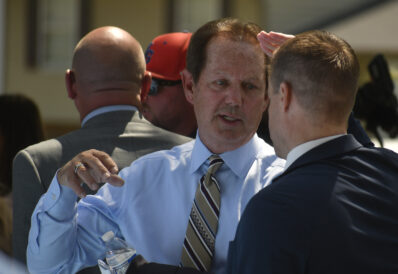Utah County Commission nixes proposed change to clerk’s office structure
- Utah County Clerk Aaron Davidson listens to Ralf Barnes, Utah County human resources director, during a county commission meeting in Provo on Wednesday, July 26, 2023.
- Utah County Commissioners, from left, Tom Sakievich, Amelia Powers Gardner and Brandon Gordon listen during a commission meeting in Provo on Wednesday, July 26, 2023.
- People listen during a Utah County Commission meeting in Provo on Wednesday, July 26, 2023.
- Utah County Clerk Aaron Davidson speaks during a county commission meeting in Provo on Wednesday, July 26, 2023.
The Utah County Commission on Wednesday rejected a proposal from Aaron Davidson, county clerk, to restructure his office following the departure of two merit-level employees in recent months.
Davidson sought a change in his office, moving from an elections director to a chief deputy. A motion to move forward with the change was made by Commissioner Tom Sakievich, though neither of the other commissioners seconded the motion. Therefore, the motion failed.
The elections director position opened May 2 when the previous director, Rozan Mitchell, left to become a training coordinator in the Utah Lieutenant Governor’s Office. To be hired as the elations director, a candidate would have to meet a set of criteria to be eligible for the position.
Moving to a chief deputy, meanwhile, would allow Davidson to appoint a person — whether or not they meet the merit system’s listed criteria — for the role.
“Losing two crucial members of my staff, I wanted the ability to hire someone competent to not only be an elections director but to be a close confidante, to me, to run the office,” Davidson said.
This person would assist not only in elections management but also help run the whole of the clerk’s office including supervising marriage licenses and passport applications.
It became apparent throughout the meeting that the so-called swing vote on the three-person commission would be Brandon Gordon. Sakievich spoke positively about the item during the meeting, eventually making the motion to adopt the change, while Amelia Powers Gardner was vocally against it.
Comparatively, Gordon spoke less than either of his colleagues, though a presumption of his position by Powers Gardner did draw a negative reaction from the audience.
At one point in the discussion, Powers Gardner said “Brandon and I” in reference to a statement Gordon already made about his preference moving forward.
The statement, though, angered Davidson and his supporters. “I apologize for assuming,” she said, to which Gordon replied, “You assumed correctly.”
After the meeting, Gordon stood by his decision in talking directly with constituents and the Daily Herald.
“What is motivating this, to do it this way, so quickly without going through (human resources)? I felt a little distrust myself in what (Davidson) was trying to do because, yeah, it seems political,” he said. After a phone conversation on Wednesday with Davidson about the change, Gordon said he began receiving emails and messages supporting Davidson’s position.
Gordon bristled at a change that he said was “taking eyes off” election supervision to handle clerical work. Davidson maintained that he, as the elected clerk, has learned enough to manage elections without a specific elections director.
“My staff is incredible, they’re the ones that run the election,” Davidson told the Daily Herald. “They did what Rozan told them to do in previous elections, and so they know what to do. Rozan kind of guided it and I’ve watched and I’ve learned a lot.”
Davidson took office in January after being elected clerk last November. While clerk/auditor from 2019 until being appointed commissioner in 2021, Powers Gardner created the position of elections director. Having an employee dedicated to elections also allows for more experience in the field, she told the Daily Herald.
“Having a career service person means that they’ve been to best-practice seminars for years. They’ve not only dealt with a lot of things in their jurisdiction, but they’ve heard the problem solving as those same issues occur in other people’s jurisdictions. It’s really just the breadth and depth of knowledge — you can’t compare it, it’s incomparable,” she said. “That is what gives you the ability to have smooth elections.”
One of Davidson’s primary arguments for the change was to more quickly hire someone to help supervise elections. Municipal primary elections will be held Sept. 5 in advance of the November election and, in 2024, an election which will include the president, governor and a U.S. Senate seat.
Every city in Utah County has contracted with the clerk’s office to manage this year’s municipal elections. Commissioners Powers Gardner and Gordon both told the Daily Herald they were contacted during and shortly after the meeting by elected municipal and state officials agreeing with their decision.
Powers Gardner added during the meeting that having the position be a merit hire, rather than an appointed person, gives them more protections in the job. An appointed person can be fired at-will while a merit hire would need to be fired for cause — thus, they argue, giving them more security in calling out potential wrongdoings by their supervisor.
“As a person that was a chief deputy and then became an elected official, and was a merit employee too before that, it was a different perspective. When I was serving as a chief deputy, my entire point was to serve the elected official. But as a merit employee, I think I felt more protection to call out things … if I thought something was out of line,” Utah County Assessor Burt Garfield said.
Garfield and Utah County Recorder Andrea Allen both spoke against Davidson’s proposal, with Garfield noting that he has one appointed deputy with a department twice the size of the clerk’s office. Utah County Auditor Rod Mann, meanwhile, said he would be unbothered by a change.
Davidson also claimed there were instances when employees declined to share information with him. When challenged by Powers Gardner to “give me a list” of the instances, Davidson responded, “I don’t have a recording of that, Amelia.”
“If you asked to see data and employees of our county refused to show you that data, we should know so that we can reprimand those employees,” Powers Gardner said.
“They didn’t refuse — well they refused, yeah — but they didn’t refuse because it was an illegal ask, they just refused because they felt they were doing me a service by not letting me be bothered, or burdened by knowledge of another process,” Davidson responded.
Ultimately, Davidson did not provide a list of said instances.
Several alternatives were also suggested by the council including time-limited hires, temporary workers to fill in the gaps until full-time hires are made, or elevating the clerk’s office’s confidential assistant to be a deputy director. This change, commissioners said, would still mean the hiring of a merit-level elections director.
The meeting proved to be abnormal, with several of the 20-30 people in attendance calling out during the commissioners’ deliberations, asking to be allowed to make public comments and either applauding or jeering.
After a brief conversation, interested community members in attendance did speak, most of whom were both in favor of Davidson’s proposed change and occasionally called out Powers Gardner by name.
Sylvia Andrew, a frequent commission meeting attendee and former candidate for state office, spent her minute directly commenting on Powers Gardner.











